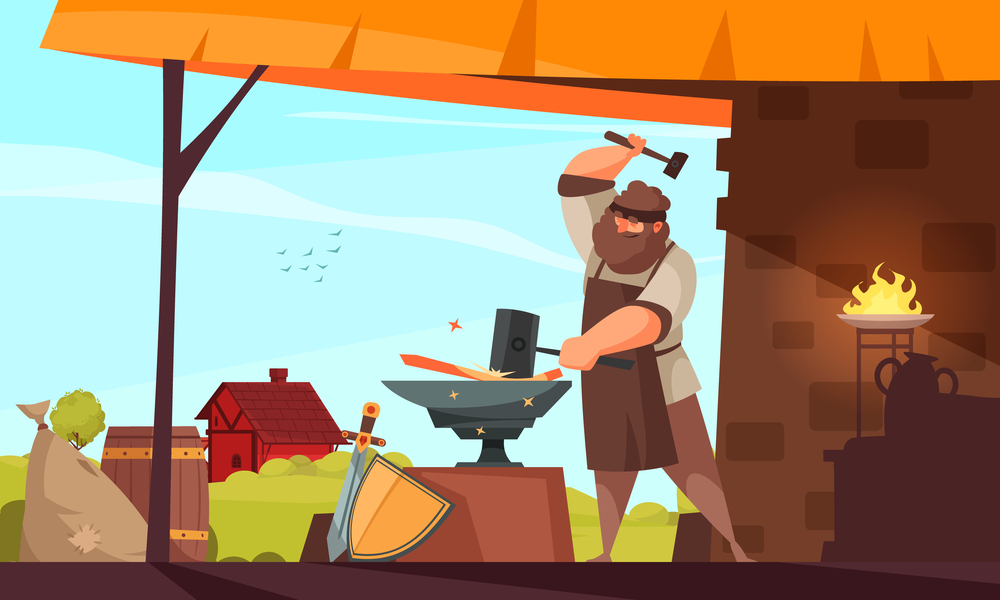So you’re a Smith, Johnson, Jones, Williams, Anderson, or know many people that are and want to know why are some last names so common?
Whether you remember hearing the same names come up during the school register or know that many sports stars have the same last name, it can be fun to find out the ancestry of common names.
Family names are most commonly derived from places, occupations, and associations. The profession of a person was the most common reason for someone to have a surname, so it is no surprise to see Smith at the top of the most common last name lists in both the USA and the UK.
Let’s take a look at why certain surnames are more common than others and take a closer look at some of the names that always seem to crop up.
Why Some Last Names are So Common
Surnames came into use in the 11th Century and have developed over time as a means of differentiating people with the same first name. There are various reasons why some last names are more common than others, even if there is plenty of variety.
The most common sources of last names include:
- Occupation (e.g., Smith, Carpenter, Cooper)
- Locative names from the area the family came from (e.g., Wood, Rivers, Marsh)
- Relation-based names (e.g., Johnson meaning “John’s son”)
- Descriptive adjectives of an ancestor
While these categories explain the origins of surnames, several factors contribute to making certain names more common:
- Widespread professions: Some occupations, like blacksmithing, were essential in every town, leading to many families adopting related surnames.
- Linguistic assimilation: As immigrants settled in new countries, many chose to simplify or anglicize their complex foreign names to better assimilate into their new culture. This voluntary change, contrary to the myth of names being altered at Ellis Island, resulted in more people adopting common, easily spelled surnames. The desire to fit in and avoid discrimination often led immigrants to choose names that sounded more familiar to their new neighbors, contributing to the prevalence of certain surnames.
- Translations across languages: Common meanings often translated similarly across cultures, leading to equivalent surnames in different languages (e.g., Smith in English, Schmidt in German, Ferrari in Italian – all relating to metalworking).
- Patronymic systems: Many cultures used patronymic naming systems, where children’s surnames were based on their father’s name. This practice led to the prevalence of names like Johnson (“John’s son”) across various cultures.
- Administrative standardization: Government efforts to standardize surnames for record-keeping sometimes resulted in the simplification or consolidation of names, increasing the frequency of certain surnames.
These factors, combined with population growth and migration patterns, have contributed to the prevalence of certain surnames across different regions and cultures.
Why Are So Many People Called Smith?
Think of a growing economy as we enjoy a brief history lesson…
Every town required the services of a Blacksmith once upon a time to make tools, household objects, and armor and weapons. As towns grew, the demand for Blacksmiths increased so it is no surprise that numerous families were adopting Smith as their surname.
A Blacksmith was a consistently important profession for centuries and was linked to the survival of a town. Other last names were less common as other professions were less significant. This is why some last names are more common than others.
Related: Are People with the Same Last Name Related?
Historical and Cultural Factors
The commonality of certain surnames is deeply rooted in historical events and cultural practices that have shaped naming conventions over centuries.
Religious Influences
Religious texts and traditions have played a significant role in surname development. The Bible, for instance, contains early examples of surnames, such as “Isaac, son of Abraham.” In Jewish culture, surnames often reflect lineage (Kohen, Levites) or were adopted due to historical circumstances.
Historical Decrees
Government mandates have significantly impacted surname adoption and commonality. A notable example is Napoleon’s decree of August 18, 1811, which prohibited the use of city names as family names and established rules for surname registration. This led to the creation of many artificial surnames, often based on precious stones or other desirable attributes.
Cultural Naming Practices
Different cultures have unique naming conventions that contribute to surname commonality. Patronymics (names based on the father’s name) are common in many cultures. Matronymics are much less common. In Arabic and Aramaic cultures, connective words like “ibn” or “bar” are used to indicate lineage.
Migration and Language Changes
As people migrated to new countries, surnames often changed due to language differences or simplification. This process has led to variations of the same name across different countries and languages, contributing to the prevalence of certain name types.
Surname Adoption Post-Slavery
In post-slavery societies, particularly in the Americas, many former slaves adopted the surnames of their former owners upon emancipation. This was done for various reasons: familiarity, maintaining family connections, or simply because it was a readily available option when required to choose a surname.
Others chose new surnames to distance themselves from their enslavers or to honor their biological families.
What Is The Most Common Last Name In The World?
Some say that Wang is the most common last name in China, although it doesn’t take long to dispute this with other sources that say Zhang and Lir are more common. Wang is shared by nearly 95 million people in mainland China.
With a population of over 1.4 billion people, it should come as no surprise that the most common surname in the world derives from China. There are many last names, but one is more common than others, although it depends on the source.
There isn’t a census to monitor this type of data which makes tracking this information difficult. However, there is no disputing that Wang is an incredibly common name in China, so it makes sense.
The Most Common Surnames In The United States
The most common surnames in the United States are:
- Smith
- Johnson
- Williams
- Brown
- Jones
- Garcia
- Miller
- Davis
- Rodriguez
- Martinez
Again, this very much depends on where you get your information, but it seems that many of these names feature in most top ten lists, there are some other honorable mentions, but the likes of Smith, Jones, Johnson, Williams, etc all feature heavily.
But what do these names mean? Well we’ve covered Smith so you know it means a Blacksmith or metal worker, and Johnson means “John’s son” but Williams means son of William, and Jones is a derivative of the first name John, Miller is another occupation, and Garcia is the son of Garcia!
Why Are There So Many Last Names?
Last names help to differentiate one David or Hannah from another, with people being able to pick their own when they originally came to light. After this, they were assigned by the government when an immigration officer could not spell the last name, they were given another.
Surnames used to be passed down by mothers and everyone knew each other in the village, so there wasn’t much use for numerous last names.
As time moved on and towns developed, the population increased meaning there was more of a reason to differentiate with new and different surnames.
Final Thoughts
So the origin of names is fascinating and goes a long way towards explaining why some last names are more common than others.
With a little research, you can often search how common yours is, and the origins behind it. You may already have an indication based on the above, so good luck in your search for understanding your last name better!



Super interesting Steve. Thanks for sending it. Gail Cooper-Schatten-Fisher